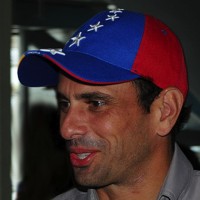CARACAS -- Venezuelans go to the polls Sunday in what some commentators have baptized the “mother of all elections.” Incumbent socialist President Hugo Chávez seeks a third consecutive term and a continuation of his “Bolivarian Revolution,” but faces a strong challenge from the social-democratic Henrique Capriles Radonski, the first opposition candidate since 1998 with a real chance of toppling Chávez.
As the campaign comes to an end, tensions are running high. Last week, three opposition campaign workers were shot to death in Chávez's home state of Barinas, allegedly by supporters of the president. Recent weeks had already seen sporadic clashes between supporters of both candidates, though without casualties. The violence has added to existing fears among opposition voters that Chávez and his supporters may not accept defeat, and that a Capriles victory could result in riots, a military coup or even civil war.
Chávez has led Venezuela since 1998, when he was voted into power on a socialist platform promising the end of an elitist party system and widespread corruption. His so-called Bolivarian Revolution has consisted of subsidies and poverty alleviation programs, combined with aggressive government intervention in the economy. These policies have guaranteed him the steady support of millions of working-class and poor voters.

